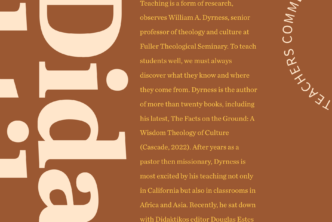Exploring the Relationship between Education and Spiritual Formation
Jeff Dryden | Covenant College
Last semester I assigned the classic C. S. Lewis text The Abolition of Man to my New Testament Ethics class. Although it had been at least a decade since I had last read the book, I felt confident I remembered the book in the main from the multiple readings I had given it in previous decades, going back to my college days when I first read it. As it turns out, old professor Lewis still had a few tricks left up his sleeve. I had understood one of the main themes of the book, but had somehow missed something essential. I confess this because I don’t think my experience is unique. (See Michael Ward’s new book, After Humanity, for a contemporary example.) I think it likely that my failure to understand Lewis was something endemic to how we have understood the goals and means of theological truth, theological education, and spiritual formation.
I was a child of the 80s. In college I studied engineering at a time when science still had a voice of objective authority. In that time and over the decades that closely followed, the primary battleground for evangelical intellectuals was epistemology, in a project that fought the agents of subjective relativism and sought to (re-)establish the grounding of truth in objective reality. It was in this context that I read and reread The Abolition of Man. (I was also reading Owen Barfield’s Saving the Appearances, which was a bit like reading Lewis while on acid.) Lewis spoke potently about the world of objective value: aesthetic and moral judgments were not statements about how one felt, but recognitions of value that existed outside one’s head. At the time, it was exactly the antidote I needed to escape my epistemological and psychological myopia. Many of us who are now educators went through some kind of epistemological struggle and questioning in the 90s and early 2000s, and all of us are products of and work within institutions that were in large measure formed by those struggles. We still live with the echoes of those battles. Some folks are still engaged in those battles. (I have doubts that those battles are still relevant for our students; more on this later.)
So, what was it that I missed in Lewis? I got one side of the argument: value has an objective existence apart from human consciousness, wishes, or feelings. The other side of Lewis’s argument is a lesson in how we recognize those values. What I somehow missed is that Lewis is not really talking about epistemology but is espousing a philosophy of education in which the purpose of education is to train student affections to recognize what is truly valuable. Oftentimes an epistemology that emphasizes objective values subliminally endorses a doctrine of objective human reason as the natural recipient of those values. I see this all the time as a biblical scholar. When someone tells me “There is an objective meaning of this text,” I know what they actually mean is “My interpretation is the only valid one.”
I assumed Lewis is talking about the objective capacity of reason to apprehend objective moral and aesthetic value. But that is not his agenda. That has been our agenda. Actually, Lewis is defining a philosophy of education as a process of aesthetic, spiritual, and moral formation. We have often inherited a model of forming our students by making sure they have the right thoughts—that they understand their doctrines and why they believe those doctrines. Lewis shocked me by saying that education is primarily about forming how my students learn to love what is good and to disdain what is evil. As he says, “A good education should build some sentiments while destroying others.” 1
There is a deep anthropology that stands behind this. In his typical fashion, Lewis sums up two millennia of moral thought in a deceptively simple metaphor: “the head rules the belly through the chest.” 2 This formula defines the chest as having a necessary role of intentionality that is in tune with the head (reason that apprehends what is right). It also says that this function of the chest is necessary to overcome the belly (irrational passions that have some purchase in the body). This assumes that the head cannot overcome those irrational passions on its own. As Lewis says, “Without the aid of trained emotions the intellect is powerless against the animal organism.” 3 It also means that the chest has to be trained to love what the head recognizes as good, otherwise it will not have the power to overcome the passions.
Most of us have grown up with a model of spiritual formation that is unapologetically rationalistic. The spearhead of formation is learning the right ideas and good principles, and if we keep reminding ourselves, our students, and our congregations of the right ideas, they will grow spiritually. I am a Presbyterian. We eat doctrine for breakfast (with a freshly brewed cup of concupiscence). This is a model that says the head rules the belly and the chest. Desires and feelings have to be subjugated to the head. In this scheme the belly and the chest become indistinguishable. (This is Christian Stoicism. Read some Epictetus and see if it sounds familiar.) As a form of spiritual formation this model produces behaviorism and moralism, because it does not have an essential place for retraining the affections and actual heart formation.
The product of this is actually the primary thing that Lewis saw as the central peril posed by modern education, what he called “men without chests” 4—moral eunuchs who have knowledge and principles but misshapen, atrophied souls, who do not love the “weightier matters of the Law” (Matt 23:23 ESV). Lewis debunks the products of this form of education as knowledgeable pseudo-intellectuals. “It is not excess of thought but defect of fertile and generous emotion that marks them out.” 5 If we are honest, we would recognize that our seminaries regularly produce graduates like this. What is more striking is how quickly these “men without chests” ascend to positions of denominational and institutional leadership.
The contemporary spiritual formation movement, which I work at the edges of, recognizes that this rationalistic formation model doesn’t really work for humans because we are not thinking-willing machines. When it is doing its best, this movement is trying to restore the relationships between head, chest, and belly. But often, led by the modern and postmodern Romantic reaction to rationalism, it ends up with the chest ruling the head and the belly. While it focuses on spiritual and psychological repair and renewal, it often divorces it from intellectual and moral formation. Again, Lewis hits the mark: “The right defense against false sentiments is to inculcate just sentiments.” 6 That is to say, spiritual formation has an essential moral
component.
So how do we as educators do the work of inculcating “just sentiments” in our students? The primary challenge we face is what Lewis recognized: our modern, rationalist, voluntarist traditions will not supply us with the materials we need to form our students; in fact, they are purpose-built to malform them. This means the problem is deeper than we are often prepared to recognize. If we simply teach the conservative version of our academic discipline (as it has come to be understood in its modern and postmodern forms), then we are not forming our students well. We have to leave behind the idea that we can simply add “spiritual formation” like a special sauce—as an extra something we do in the last ten minutes of class. We have to do the hard intellectual and spiritual work of reimagining our disciplines in categories that integrate intellectual, moral, psychological, and spiritual formation. Nothing within the guild will encourage this type of work.
This also means hard and spiritually challenging work for us—the kind of work that many of us got into academics to avoid: the messy, painful, and confounding work of our own spiritual formation. We cannot take students somewhere we have not been. Nouwen once said that “spiritual formation begins with the gradual and often painful discovery of God’s incomprehensibility in the face of life’s great mysteries and limitations.” 7 This is precisely the thing that we, especially as theological conservatives, have been trained to avoid—and are training others to avoid. Alongside teaching the many perfections and virtues of God, we have to demonstrate that he is the anchor of our souls amid the bewildering doubts that painful trials inflict upon us.
Let me give two examples of pedagogical changes I have made to foster spiritual formation in the classroom. First, when I teach Christology, I use both ontological and relational categories in approaching the classical christological heresies. For instance, Apollinarianism (the default Christology of all my students) is a problem not only as an ontological heresy, but also because it disrupts and limits how we relate to Jesus. This is precisely the point of Hebrews 4:15–16: “For we do not have a high priest who is unable to sympathize with our weaknesses, but one who in every respect has been tempted as we are, yet without sin. Let us then with confidence draw near to the throne of grace, that we may receive mercy and find grace to help in time of need” (ESV). If Jesus is a divine rationality in an earth suit, our connection to him in our struggles is lost.
We were trained in the “head rules the belly and the chest” model, processing things first intellectually, then ethically, and finally emotionally. Our students (Millennials and GenZs) process things in exactly the opposite order. They first process things emotionally, then ethically, and lastly intellectually. This means that real access to their intellectual formation only comes through accessing things emotionally. So, in the example of Christology, if I can get them to understand how different Christologies feel relationally, then they actually care about the ontological categories. They can learn the ontological categories apart from this and engage with it as an intellectual game, but it doesn’t actually touch how they process life and make decisions.
The other thing I do is very simple: I ask students how a particular doctrine or text makes them feel. I am glad none of my professors ever asked me this question when I was a graduate student. I don’t think it would have worked for our generation, but today’s students process things primarily emotionally. If we don’t do it in the classroom, then we are not dealing with the core of who they are as students. We cannot look at them disapprovingly and think our job is to get them to process things the way we would, primarily intellectually. I meet many students who have learned to accommodate their professors by pretending to be little modernists. But sadly, it is just a game to them, and it never really touches how they live and process life.
Asking students how they feel, while it might sound touchy-feely, is the only way I know to gain access to what students really think and to actually shape them in how they live. The problem is that this means we as teachers need to dig into the messy bits of what we feel, and why it is that, although I know a particular doctrine is true on paper, something inside me still resists accepting it fully. Again, we cannot take students somewhere we are not willing to go. Although the intellectual work we do is hard, it is much easier to articulate our Christology theoretically than to investigate why I still struggle every day to trust Jesus. If we want to be faithful in forming our students, we have to find our own way of doing both.
Jeff Dryden is working on a commentary on 2 Corinthians and two other books—one on the gospel and race, and one on evangelical moralism.
This article was first published in Didaktikos: Journal of Theological Education. You can sign up for a free print subscription as a theological faculty member here:
- C. S. Lewis, The Abolition of Man (New York: Collier-Macmillan, 1955), 24.
- Lewis, Abolition of Man, 34.
- Lewis, Abolition of Man, 33–34.
- Lewis, Abolition of Man, 34.
- Lewis, Abolition of Man, 35.
- Lewis, Abolition of Man, 24.
- Henri Nouwen, Spiritual Formation: Following the Movements of the Spirit (New York: HarperCollins, 2010), 3.





